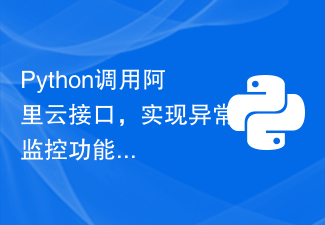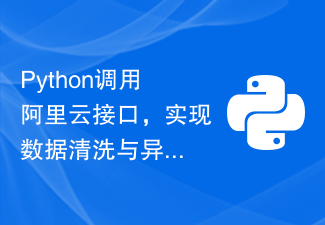 Backend Development
Backend Development Python Tutorial
Python Tutorial Python calls the Alibaba Cloud interface to implement abnormal monitoring and alarm functions
Python calls the Alibaba Cloud interface to implement abnormal monitoring and alarm functionsPython calls the Alibaba Cloud interface to implement abnormal monitoring and alarm functions
With the rapid development of cloud computing, more and more companies have begun to deploy their applications on cloud platforms. In this case, it is particularly important to find and solve abnormal problems in the application in time. This article will introduce how to use Python to call the Alibaba Cloud interface to implement abnormal monitoring and alarm functions.
Alibaba Cloud provides a series of monitoring services. Through these services, we can monitor the status of applications in real time and issue alarms in a timely manner when there are abnormalities. In this article, we will use Alibaba Cloud's cloud monitoring service to complete this work.
First, we need to create a RAM user on the Alibaba Cloud console, authorize the user, and give it the permission to call the cloud monitoring interface. For specific steps to create a RAM user and authorization, please refer to Alibaba Cloud's official documentation.
In Python, we can use Alibaba Cloud's SDK to call the cloud monitoring interface. First, you need to install the aliyun-python-sdk-core package and aliyun-python-sdk-cms package. These two packages can be installed through the pip tool. The specific commands are as follows:
pip install aliyun-python-sdk-core pip install aliyun-python-sdk-cms
In the code, you first need to import the corresponding module, as shown below:
from aliyunsdkcore.client import AcsClient from aliyunsdkcms.request.v20180308 import PutMetricDataRequest
When creating the AcsClient object, You need to pass in your own Alibaba Cloud AccessKey ID and AccessKey Secret. The code example is as follows:
access_key_id = 'your_access_key_id' access_key_secret = 'your_access_key_secret' region_id = 'your_region_id' client = AcsClient(access_key_id, access_key_secret, region_id)
Next, you need to construct the PutMetricDataRequest object and set the corresponding parameters. The Namespace parameter is used to identify the service type, the MetricName parameter is used to identify the indicator name, and the Dimensions parameter is used to identify specific resources.
The following is a sample code snippet for reporting a custom exception indicator:
request = PutMetricDataRequest.PutMetricDataRequest()
request.set_Namespace('YourNamespace') # 设置Namespace
request.set_MetricName('YourMetricName') # 设置MetricName
request.set_Dimensions('YourDimensions') # 设置Dimensions
request.set_Values('YourValues') # 设置指标值
client.do_action_with_exception(request)In the above sample code, "YourNamespace", "YourMetricName", "YourDimensions" and "YourValues" "respectively represent the parameter values you need to set. You can adjust the values of these parameters according to actual needs.
Finally, we can put the above code in a loop to monitor the status of the application and send alarm notifications when there are exceptions. The code example is as follows:
while True:
# 检测应用程序状态
if is_abnormal():
# 发送异常报警
request = PutMetricDataRequest.PutMetricDataRequest()
request.set_Namespace('YourNamespace')
request.set_MetricName('YourMetricName')
request.set_Dimensions('YourDimensions')
request.set_Values('YourValues')
client.do_action_with_exception(request)
time.sleep(60)In the above example code, we use the is_abnormal function to detect the status of the application. If an abnormality is found, the cloud monitoring interface is called to send an alarm. The frequency of monitoring is controlled through the time.sleep function, which is set to monitor every 60 seconds.
So far, we have completed all the steps of using Python to call the Alibaba Cloud interface to implement abnormal monitoring and alarm functions. The above code examples can help you better understand how to use Python to call Alibaba Cloud interfaces to implement exception monitoring and alarm functions. Hope this article is helpful to you.
The above is the detailed content of Python calls the Alibaba Cloud interface to implement abnormal monitoring and alarm functions. For more information, please follow other related articles on the PHP Chinese website!
 使用Gin框架实现实时监控和报警功能Jun 22, 2023 pm 06:22 PM
使用Gin框架实现实时监控和报警功能Jun 22, 2023 pm 06:22 PMGin是一个轻量级的Web框架,它采用了Go语言的协程和高速路由处理能力,能够快速地开发高性能的Web应用程序。在本文中,我们将探讨如何使用Gin框架实现实时监控和报警功能。监控和报警是现代软件开发的重要部分。在一个大型系统中,可能会有数千个进程、数百个服务器、数以百万计的用户。这些系统产生的数据量常常是惊人的,因此需要一种能够快速处理这些数据并及时警告系统
 基于Go语言的微服务异常监控与处理方案Aug 11, 2023 pm 02:36 PM
基于Go语言的微服务异常监控与处理方案Aug 11, 2023 pm 02:36 PM基于Go语言的微服务异常监控与处理方案引言随着微服务架构在软件开发中的广泛应用,系统的复杂性不断增加,异常监控与处理变得尤为重要。本文将介绍基于Go语言的微服务异常监控与处理方案,通过对异常的收集、上报和处理,提高系统的稳定性和可靠性。一、异常监控的重要性在微服务架构中,由于系统由多个微服务组成,每个微服务都有自己的数据流动和处理流程,因此难免会出现各种异常
 PHP 中基于 Elasticsearch 的日志分析与异常监控Oct 03, 2023 am 10:03 AM
PHP 中基于 Elasticsearch 的日志分析与异常监控Oct 03, 2023 am 10:03 AMPHP中基于Elasticsearch的日志分析与异常监控概要:本文将介绍如何使用Elasticsearch数据库来进行日志分析和异常监控。通过简洁的PHP代码示例,展示了如何连接Elasticsearch数据库、将日志数据写入数据库,并使用Elasticsearch的强大查询功能来分析和监控日志中的异常情况。介绍:日志分析和异常监控是
 Python调用阿里云接口,实现异常监控功能Jul 05, 2023 pm 04:03 PM
Python调用阿里云接口,实现异常监控功能Jul 05, 2023 pm 04:03 PMPython调用阿里云接口,实现异常监控功能阿里云提供了丰富的接口和服务,可以帮助开发者进行各种操作和管理。在实际应用中,我们经常需要监控系统的异常情况,以便及时发现问题并采取相应的措施。本文将介绍如何使用Python来调用阿里云接口,实现异常监控功能。首先,我们需要在阿里云控制台上创建并配置相应的服务和权限。具体步骤如下:登录阿里云控制台,找到“RAM访问
 如何在MongoDB中实现数据的实时监控和报警功能Sep 19, 2023 am 11:04 AM
如何在MongoDB中实现数据的实时监控和报警功能Sep 19, 2023 am 11:04 AM如何在MongoDB中实现数据的实时监控和报警功能摘要:在大数据时代,数据的安全性和可靠性成为了企业重要的关注点。为了保护企业的数据,并及时发现数据异常情况,实时监控和报警功能变得至关重要。本文将介绍如何在MongoDB数据库中实现数据的实时监控和报警功能的方法,并提供具体的代码示例。引言MongoDB是一个流行的开源文档数据库,因其高性能、可扩展性和灵活性
 Python调用阿里云接口,实现数据清洗与异常监控功能Jul 05, 2023 am 09:27 AM
Python调用阿里云接口,实现数据清洗与异常监控功能Jul 05, 2023 am 09:27 AMPython调用阿里云接口,实现数据清洗与异常监控功能随着互联网和大数据技术的不断发展,数据分析和处理变得越来越重要。为了保证数据的准确性和完整性,我们需要对数据进行清洗和监控。阿里云提供了丰富的接口和工具,可以方便地实现数据清洗和异常监控功能。本文将介绍如何使用Python调用阿里云接口,实现数据清洗与异常监控功能。数据清洗功能数据清洗是指对数据进行去除错
 如何利用PHP开发商城实现商品库存报警功能Jul 03, 2023 am 10:15 AM
如何利用PHP开发商城实现商品库存报警功能Jul 03, 2023 am 10:15 AM如何利用PHP开发商城实现商品库存报警功能随着电商行业的快速发展,越来越多的企业选择通过网上商城进行商品销售。然而,在商品销售过程中,库存管理成为了一个非常重要的问题。如果没有有效的库存报警机制,企业可能会面临商品库存不足或过剩的风险。而利用PHP来开发商城系统,并实现商品库存报警功能成为了一种解决方案。一、建立商品库存数据库首先,我们需要建立一个商品库存的
 Python调用阿里云接口,实现异常监控与报警功能Jul 05, 2023 pm 01:21 PM
Python调用阿里云接口,实现异常监控与报警功能Jul 05, 2023 pm 01:21 PMPython调用阿里云接口,实现异常监控与报警功能随着云计算的快速发展,越来越多的企业开始将自己的应用程序部署在云平台上。在这种情况下,如何及时发现并解决应用程序中的异常问题尤为重要。本文将介绍如何使用Python调用阿里云接口,实现异常监控与报警功能。阿里云提供了一系列的监控服务,通过这些服务,我们可以实时监控应用程序的状态,并在有异常时及时发出报警。在本


Hot AI Tools

Undresser.AI Undress
AI-powered app for creating realistic nude photos

AI Clothes Remover
Online AI tool for removing clothes from photos.

Undress AI Tool
Undress images for free

Clothoff.io
AI clothes remover

AI Hentai Generator
Generate AI Hentai for free.

Hot Article

Hot Tools

MinGW - Minimalist GNU for Windows
This project is in the process of being migrated to osdn.net/projects/mingw, you can continue to follow us there. MinGW: A native Windows port of the GNU Compiler Collection (GCC), freely distributable import libraries and header files for building native Windows applications; includes extensions to the MSVC runtime to support C99 functionality. All MinGW software can run on 64-bit Windows platforms.

DVWA
Damn Vulnerable Web App (DVWA) is a PHP/MySQL web application that is very vulnerable. Its main goals are to be an aid for security professionals to test their skills and tools in a legal environment, to help web developers better understand the process of securing web applications, and to help teachers/students teach/learn in a classroom environment Web application security. The goal of DVWA is to practice some of the most common web vulnerabilities through a simple and straightforward interface, with varying degrees of difficulty. Please note that this software

Notepad++7.3.1
Easy-to-use and free code editor

SublimeText3 Mac version
God-level code editing software (SublimeText3)

Atom editor mac version download
The most popular open source editor





